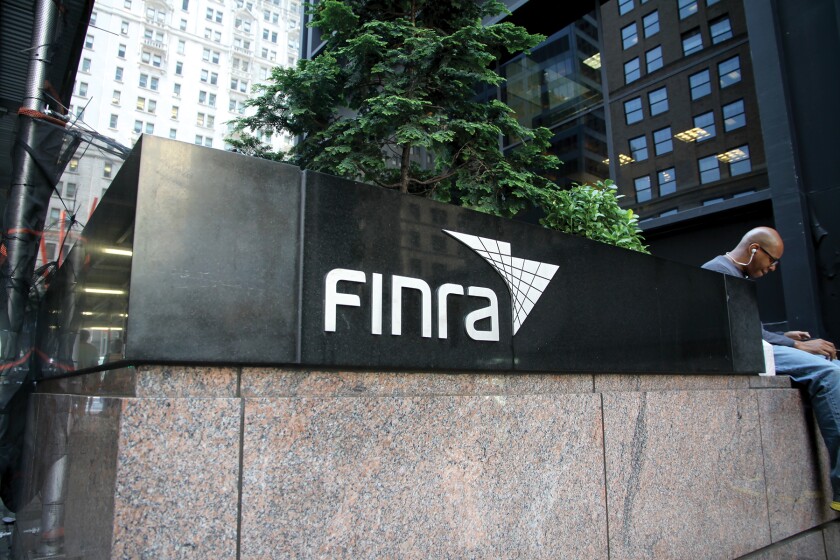Q: I’m a dually registered investment advisor and registered representative. I’m registered with a broker-dealer but also have my own registered investment advisory firm. I’ve heard about the Paycheck Protection Program loan available for those affected by COVID-19 and the economic disruptions everyone is facing but my broker-dealer warned me against taking the loan saying that it might be a reportable event on my U4 since it’s a forgivable loan and could be seen as a compromise with creditors. Can you shed any light on this?
A: The U.S. Small Business Administration has made Paycheck Protection Program loans available to certain individuals and small businesses to offset some of the financial hardships they are experiencing during the coronavirus crisis. A PPP loan is eligible for forgiveness if the terms of the loan are satisfied. FINRA has recently issued some guidance on this topic and has indicated that if a registered person or their business obtains a PPP loan and the loan or part of the loan is forgiven, the registered person will not be required to report that forgiveness in response to Question 14K on their Form U4 as a “compromise with a creditor,” as long as the PPP loan is forgiven in accordance with the original terms of the loan.

FINRA’s Form U4 and U5 interpretive questions and answers section explains that “A compromise with one or more creditors generally involves an agreement between a borrower and a creditor in which a creditor agrees to accept less than the full amount owed in full satisfaction of an outstanding debt,” unless such an agreement is included in the original terms of the loan.’ (Emphasis added.)
In the agency's other FAQ, it states that “Because a PPP loan contemplates forgiveness of some or all of the loan as part of the original terms of the loan, such forgiveness will not involve a new agreement by the creditor, but will be an event consistent with the loan’s original terms. … In those circumstances, the forgiveness of a PPP loan will not be a ‘compromise with creditors’ for purposes of Form U4 Question 14K. Any forgiveness beyond the original terms of the loan would be considered a ‘compromise with creditors.’”
However, since you also own a registered investment advisory firm, you should be aware of possible disclosure requirements in Item 18 of the Form ADV Part 2A disclosure brochure. That section requires disclosure of any “financial condition that is reasonably likely to impair your ability to meet contractual commitments to clients.”
I disagree somewhat that taking a PPP loan by itself is an indication that the firm is in financial trouble necessitating an Item 18 disclosure. After the 2008 crash, TARP provided free government lines of credit for businesses that applied, and this was not seen as a disclosable item in most cases.
With that said, the loan requires that the signatory certify that “Current economic uncertainty makes this loan request necessary to support the ongoing operations of the applicant.” I think this certification is relevant as to whether the firm has an adverse condition that is preventing it from meeting its obligations under the advisory agreement.
So I think the question of whether a disclosure is required would likely be based on whether the RIA is not in immediate financial trouble and simply takes the loan as a safety net or as a precautionary measure, as opposed to RIAs that are in financial trouble now and would be out of business or unable to meet their commitments absent the loans.
Additionally, if the loans are needed to meet payroll but would have no impact on the firm’s commitments to its clients, the argument could be made that no disclosure is therefore required. You should discuss these issues with your legal counsel before applying for a PPP loan.
Update 5/5/20: The SEC has published additional guidance concerning the Payroll Protection Program (PPP) and the disclosure requirements for advisors.
The commission now says that if you took the loan in order to pay employee salaries, you should disclose that in your Form ADV Disclosure Brochure. This is just an example that the commission gives in the FAQ. As I noted earlier, Item 18 of the Form ADV requires advisors to “disclose any financial condition that is reasonably likely to impair your ability to meet contractual commitments to clients.”
My takeaway from the SEC’s FAQ is that they will likely consider any use of the loan for any sort of operational purposes as “likely to impair your ability to meet your contractual commitments to your clients.”
Think of it this way: If you have to furlough employees or even close your doors because of finances, that would likely impair your ability to meet your contractual commitments to your clients. Based on this guidance, I would suggest that investment advisors who have taken a PPP loan, should, in most cases, disclose it in Item 18 of the Form ADV Part 2A or, at a minimum, in a separate disclosure document delivered to all your clients.
You can read the SEC’s guidance here: https://www.sec.gov/investment/covid-19-response-faq
Please send your questions for compliance expert Alan Foxman to fpeditor@arizent.com.

